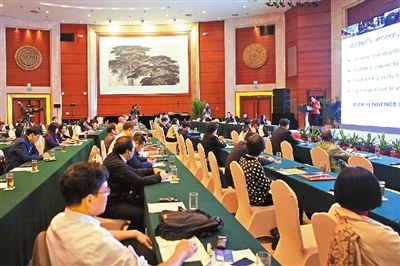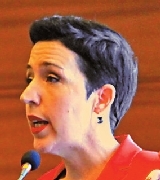
France Desmarais, director of programs and partnerships of the International Council of Museums, gives a speech on fighting illicit traffic in cultural goods at the Wuzhou Guest House yesterday morning. Sun Yuchen

France Desmarais
A Ding
adinglily@hotmail.com
Representatives of museums and cultural sectors from various countries, curators and scholars gathered in Shenzhen yesterday morning at the UNESCO High-level Forum on Museums and participated in a panel discussion to talk about fighting illicit traffic in cultural goods and the importance of records, registration and identification of museum objects.
The panel was hosted by Woljciech Kowalski, a professor at Silesian University of Technology in Poland. The invited participants included Duan Yong, director of the State Administration of Cultural Heritage Museum in China; France Desmarais, director of programs and partnerships of the International Council of Museums (ICOM); Wu Fuqing, director of the Zhizheng Art Museum in Shenzhen; Amara Srisuchat, chief consultant of the Ministry of Culture in Thailand; and Chedlia Annabi, director of the National Museum of Carthage in Tunisia.
Duan, as the first speaker, introduced official measures taken by China to prevent the illicit traffic in cultural goods. The five main measures include documentations and inventories: national general survey of cultural heritage; identification and authentication: legislation and standardization; ethics and due diligence: auction and museum collections registration; a line of defense: examination by authority for entry and exit of cultural heritage; implementing international instruments and enhancing international cooperation.
Desmarais from Canada talked about the role of the World Museum Community in today’s world. She said, “The protection of heritage is a huge topic and it’s difficult to summarize this complex issue within 15 minutes. Therefore, I would like to lay emphasis on the practical tools about preventing illicit traffic in cultural goods.”
The tools she mentioned included establishing inventories, such as an Interpol database of stolen works of art, an ICOM Red List of cultural objects at risk and mode of export certificates, among others.
Wu — vice chairman of the UNESCO World Museums Strategic Alliances and director of the Zhizheng Art Museum, one of the co-organizers of the forum — said at the panel that protecting cultural relics is an unavoidable choice for the sustainable development of a country. In addition, Wu called for the attention of all professionals to the importance of protecting private museums.
Wu shared his family story and said, “During the war, my grandfather escaped to the remote countryside in order to protect precious collections at risk. I believe collections from the folk are the best.”
Wu is the fifth generation of successors to inherit family collections. He now owns enterprises covering high-tech, bio-nano and other various areas. Each year he spends 70 percent of those enterprises’ profits purchasing Chinese cultural relics around the world. He is determined to preserve and disseminate Chinese culture.
“I come to Shenzhen from an ancient city in Anhui Province. I think cultural heritage in Shenzhen is indispensable and that this young city, as an example of China’s reform and opening up, should develop further by standing on the shoulders of culture,” Wu said.
He also emphasized the shared mission of private and public museums. He said, “Both kinds of museums should undertake the mission of inheriting culture.”
Editor: Jane Chen